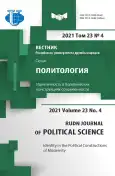Ideological Preferences of Kaliningrad Residents in the Socio-Political System
- Autores: Krishtal M.I.1
-
Afiliações:
- Immanuel Kant Baltic Federal University
- Edição: Volume 23, Nº 4 (2021): Identity in the Political Constructions of Modernity
- Páginas: 584-599
- Seção: THE DIMENSIONS OF IDENTITY IN MODERN RUSSIA
- URL: https://journal-vniispk.ru/2313-1438/article/view/322096
- DOI: https://doi.org/10.22363/2313-1438-2021-23-4-584-599
- ID: 322096
Citar
Texto integral
Resumo
The article analyzes the ideological preferences of the residents of the Kaliningrad region through the prism of their socio-economic situation and political behavior. The study is based on the data of a formalized interview (N = 977) according to the age and sex sample, representing the population of four geodemographic districts of the Kaliningrad region. Based on the Nolan Chart, the study determines ideological types according to the respondents’ attitude to political and economic freedom. The statistical analysis of the data revealed a high degree of pluralism among the residents of the region on the issues under consideration. At the same time, it showcased the prevailing ideas of state regulation of the economy and values of personal freedom. Analyzing the socio-economic situation of the respondents and their inherent ideological attitudes, the author found that the values of economic freedom are more often shared by young people, middle-aged people, residents living in Kaliningrad, with higher income. Ideas of state regulation of the economy prevail among people of retirement and pre-retirement age, residents of the semi-periphery of the Kaliningrad region, with lower income. The study also revealed the relationship between the ideological attitudes of people in the region and their political behavior. In particular, it found that people who share the values of political and economic freedom are ready to take the most active part in protests. At the same time, the study did not identify any significant links between the ideological type of the respondents and their electoral behavior.
Sobre autores
Mikhail Krishtal
Immanuel Kant Baltic Federal University
Autor responsável pela correspondência
Email: MKrishtal@kantiana.ru
ORCID ID: 0000-0001-6167-1025
PhD in Geography, Senior Research Fellow, Sociological Lab, Institute for Geopolitical and Regional Studies
Kaliningrad, Russian FederationBibliografia
- Alimpieva, A.V. (2014). Social identity in the conditions of cultural diversity: A search or imposition? (the case of the Kaliningrad region). IKBFU’s Vestnik. Series: Philology, pedagogy, psychology, 11, 60–66. (In Russian).
- Anderson, C.J., & Mendes, S.M. (2006). Learning to Lose: Election Outcomes, Democratic Experience and Political Protest Potential. British Journal of Political Science, 36(1), 91–111. doi: 10.1017/S0000000000000000
- Bourdieu, P. (1993). Political positions and cultural capital. Sociology of politics, 98–162. (In Russian).
- Cameron, R. (2017). The Russian middle class: Agent of democracy or bastion of the status-quo? Political science (RU), 1, 162–185. (In Russian).
- Erikson, R.S. (2015). Income Inequality and Policy Responsiveness. Annual Review of Political Science, 18, 11–29. doi: 10.1146/annurev-polisci-020614-094706
- Klemeshev, A., Fidrya, E., & Fedorov, G. (2017). Specific Kaliningrad character of the Russian identity. Bulletin of Geography. Socio-economic Series, 38, 47–55. DOI: http://dx.doi.org/10.1515/bog-2017-0033
- Korotaev, S.A., & Gasyukova, E.N. (2019). The Social Differences and Political Participation: The Mediating Effect of Ideological Position. Economic Sociology, 20(3), 99–135. (In Russian). doi: 10.17323/1726-3247-2019-3-185-205
- Krishtal, M.I. (2018a). Geography of voting in the presidential elections of 2018 in the Kaliningrad region. IKBFU’s Vestnik. Series: Humanities and Social Sciences, (4), 75–82. (In Russian).
- Krishtal, M.I. (2018b). Kaliningrad Exclave: Electoral Specificity. IKBFU’s Vestnik. Series: Humanities and Social Sciences, (2), 93–108. (In Russian).
- Krishtal, M.I. (2019). Electoral preferences within the KALININGRAD oblast in 2003–2018. Regional Research, 1(63), 99–107. (In Russian).
- Kuznetsova, T.Yu. (2016). Geo-demographic typology of municipalities of the Kaliningrad region. IKBFU’s Vestnik. Series: Natural and medical sciences, (1), 15–27. (In Russian).
- Lanskaya, T.M. (2017). Uneven development of administrative-territorial entities as a threat to the economic security of the Kaliningrad region. IKBFU’s Vestnik. Series: Humanities and Social Sciences, (3), 37–45. (In Russian).
- Martynova, M.Yu. (2014). Kaliningraders: Geopolitical Challenges and Regional Subculture. Geopolitics Journal, (3), 2–20. (In Russian).
- Morrell, M.E. (2003). Survey and Experimental Evidence for a Reliable and Valid Measure of Internal Political Efficacy. The Public Opinion Quarterly, 67(4), 589–602. https://doi.org/10.1086/378965
- Paas, T., & Demidova, O. (2014). What Explains People’s Attitudes Towards Immigrants? A Comparative Study of Estonia and Russia. The University of Tartu Faculty of Economics and Business Administration Working Paper, (94).
- Popova, O.V. (2017). Political consciousness of today’s Russian young people. Political science (RU), 1, 138–162. (In Russian).
- Turovskii, R.F., & Gaivoronskii, Yu.O. (2017). The Impact of the Economy on Electoral Behavior in Russia: Does the Contract between the Authorities and Society Work? Politeia, (3), 42–61. (In Russian).
- Visser, M., Lubbers, M., Kraaykamp, G., & Jaspers, E. (2014). Support for Radical Left Ideologies in Europe. European Journal of Political Research, 53(3), 541–558. https://doi.org/10.1111/1475-6765.12048
- Zhukovskii, I.I., & Fidrya, E.S. (2016). The perception of Kaliningrad region inhabitants of the region’s status: dynamics 2001–2016 and factors in preference formation. Moscow University Bulletin. Series 12. Political Science, (6), 73–89. (In Russian).
Arquivos suplementares









